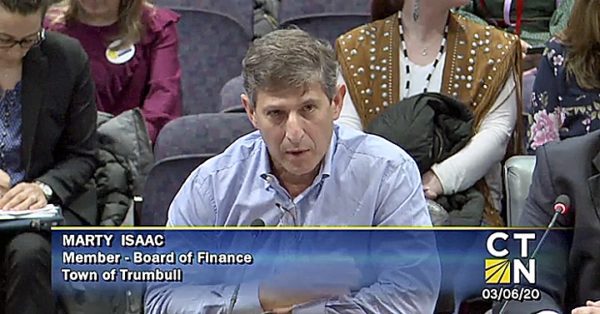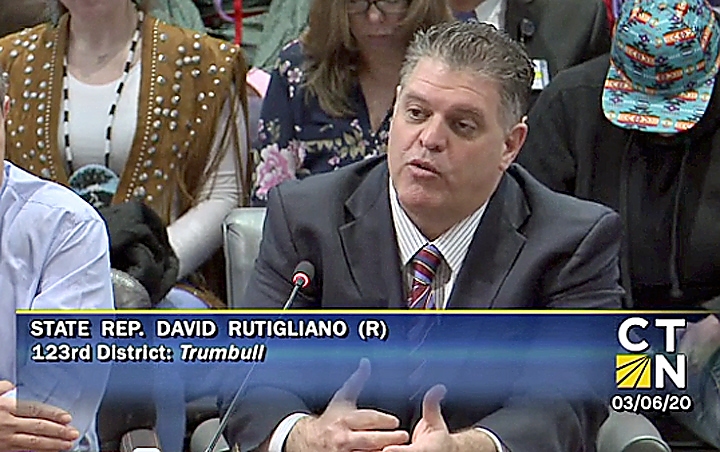

HARTFORD, CT – An old issue – to have earlier school start times across the state studied by the Department of Education – was the subject of a public hearing Friday.
Supporting the establishment of a working group to study issues relating to school start times, specifically to allow middle-and-high school students more sleep time received backing at the hearing.
“We are one of only four states that have an average school start time before 7:45 a.m.,” Marty Isaac told the Education Committee.
Isaac, who sits on the Board of Finance in Trumbull, said it was too late for his children, but not for others.
“My presence here today is to not advocate for my children – it’s too late for them. So why am I here? I’m here today because the data is so abundantly clear regarding start times – that we are harming children by starting school so early,” Isaac said.
Connecticut has some of the earliest school start times in the country, according to a recent report.
Isaac credited Rep. David Rutigliano, R-Trumbull, for proposing a bill to establish a working group to look at best practices.

“After listening to the science, it is quite clear, our students would benefit with later start times,” Rutigliano said.

Isaac said it’s a health issue.
“I was in this room in October of last year when Dr. Maria La Russo spoke to this committee in detail about the impact of school start times on adolescent mental health. She is not alone. The AMA, the CDC, the American Psychological Association, and the American Academy of Pediatricians have all issued statements stating middle and high schools should not start before 8:30 a.m.”
Isaac added that the issue is urgent.
“The question should be how we should make this happen – not if we can make this happen,” he said. “Recognize that a partial movement to say 8 a.m. is not acceptable. That is akin to finding exposed asbestos in a school and removing only a portion of it. Yes, the situation would be better than before the remediation – but would not be deemed an acceptable solution.”
Education Commissioner Miguel Cardona was sympathetic but warned of the unintended consequences.
“We are also aware of the growing evidence from a variety of studies regarding the impact of student learning when it comes to start times,” Cardona said. “However, there are larger implications that must be taken into consideration outside of the scope of work that is outlined in this bill.”
Teacher contracts and bus schedules could be impacted by switching school start times, Cardona said.
“Traffic patterns and volume throughout the day would also need to be taken into consideration for timing purposes. We do not believe there could ever be a one size fits all solution to the issue of schools start times for the entire state,” Cardona said. “What works in one area, will invariably not work in another. We are also concerned about the impact this will have on staff time and resources within the Department, which are already stretched.”
Cardona said as always, his department would be very willing to meet with the chairs, or the proponents of the bill.
The issue of school start times has continued to be one that bubbles to the top as an issue in many Connecticut towns. In recent years the town of Guilford has joined a small group of Connecticut towns that have moved their school start times later to allow kids more sleep.
While multiple studies have shown that starting school later is a good idea to allow students more sleep the issue, in the words of Guilford Board of Education Chairman William Bloss, “is the most difficult issue I’ve faced in my years on the school board.”
Bloss said the time change impacts after-school employment for high school students, child care, sports, other after-school activities such as arts or music, and participation in programs at magnet schools.
Over a decade ago, the town of Wilton switched start times at its middle and high schools from 7:35 a.m. to 8:15 a.m. for students in grades 6 to 12. Elementary school students in Wilton switched to the earliest time start slot — 7:35 a.m.
And in the 2017-18 school year Greenwich went to later start times for high school and middle school students after a lengthy study of the issue.
Besides those two and Guilford, school officials in Bridgeport, Cheshire, Ridgefield, Westport, and West Hartford, among others, have held various levels of discussion about starting later.
While the high school start time in Guilford has moved to 7:40 a.m., the hope by proponents was, and still is, to move it even later, targeting 7:55 a.m. as an eventual goal.
One of the biggest advocates in Guilford for later school start times was Dr. Craig Canapari, a parent and director of the Yale Pediatric Sleep Center.
In his practice, he treats teens whose biggest problem is a lack of sleep, Canapari said, which can lead to anxiety, depression, poor impulse control, emotional problems, and decreased motivation.
Canapari said sleep deprivation increases the likelihood of car accidents, which is the biggest cause of death for teens.
The National Sleep Foundation found that research shows the natural tendency for teenagers is to stay up late at night and wake up later in the morning. This research indicates that school bells that ring as early as 7 a.m. in many parts of the country stand in stark contrast with adolescents’ sleep patterns and needs.
Evidence suggests that teenagers are indeed seriously sleep deprived. A recent poll conducted by the National Sleep Foundation found that 60 percent of children under the age of 18 complained of being tired during the day, according to their parents, and 15 percent said they fell asleep at school during the year.
Local school officials believe changing school start times might be easier accomplished if the state took the lead.
As the mother of three, and as a former school board member, state Sen. Christine Cohen, D-Guilford, knows a thing or two about sleep-deprived students.
“As a former Board of Education member in Guilford, and as the mother of three school-aged children, I can tell you from firsthand experience that, yes, kids need their sleep if they are to perform well in school and if they are to maintain some sort of emotional and behavioral equilibrium throughout the day,” Cohen said. “I served on the Guilford Board of Education’s School Start Times Task Force. The science is there. The biology of adolescent sleep is well-known. Now all we need to do as a society is to recognize the benefit of later school start times and act on it. Change is always difficult, but our priorities must rest with the mental health and well-being of our youth.”
HB 5217 directs the Commissioner of Education to establish a working group to study issues relating to school start times, including: the effect of the start time of school instruction on child growth and development; whether there is a correlation between school start times and educational outcomes and student productivity; the feasibility of implementing a uniform school start time in Connecticut; and whether any other states have implemented a mandatory school start time requirement.
The working group must include members who represent school boards, superintendents, teachers, administrators, and the parents of students. Its report would be due by January 1, 2021.
Cohen said it’s important that any later school start time be implemented state-wide in order to standardize school bus transportation routes, dining hours, athletic practices and games, after-school clubs and activities, after-school jobs, and homework schedules.
The Education Committee has until March 23 to vote on the bill.
